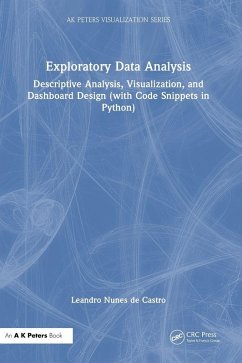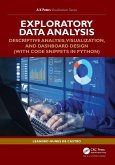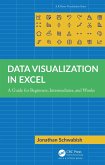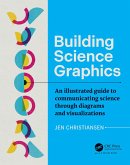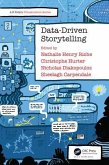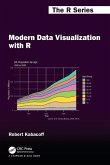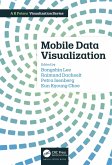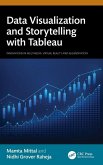Leandro Nunes de Castro
Exploratory Data Analysis
Descriptive Analysis, Visualization, and Dashboard Design (with Code Snippets in Python)
Leandro Nunes de Castro
Exploratory Data Analysis
Descriptive Analysis, Visualization, and Dashboard Design (with Code Snippets in Python)
- Gebundenes Buch
- Merkliste
- Auf die Merkliste
- Bewerten Bewerten
- Teilen
- Produkt teilen
- Produkterinnerung
- Produkterinnerung
The book explores real-world datasets, uncovering hidden patterns and gaining insights along the way. The book is filled with illustrations using practical examples, Python codes, and different types of exercises designed to reinforce the concepts and processes discussed.
Andere Kunden interessierten sich auch für
![Exploratory Data Analysis Exploratory Data Analysis]() Leandro Nunes de CastroExploratory Data Analysis81,99 €
Leandro Nunes de CastroExploratory Data Analysis81,99 €![Data Visualization in Excel Data Visualization in Excel]() Jonathan SchwabishData Visualization in Excel25,99 €
Jonathan SchwabishData Visualization in Excel25,99 €![Building Science Graphics Building Science Graphics]() Jen ChristiansenBuilding Science Graphics61,99 €
Jen ChristiansenBuilding Science Graphics61,99 €![Data-Driven Storytelling Data-Driven Storytelling]() Data-Driven Storytelling85,99 €
Data-Driven Storytelling85,99 €![Modern Data Visualization with R Modern Data Visualization with R]() Robert KabacoffModern Data Visualization with R98,99 €
Robert KabacoffModern Data Visualization with R98,99 €![Mobile Data Visualization Mobile Data Visualization]() Mobile Data Visualization81,99 €
Mobile Data Visualization81,99 €![Data Visualization and Storytelling with Tableau Data Visualization and Storytelling with Tableau]() Mamta MittalData Visualization and Storytelling with Tableau154,99 €
Mamta MittalData Visualization and Storytelling with Tableau154,99 €-
-
-
The book explores real-world datasets, uncovering hidden patterns and gaining insights along the way. The book is filled with illustrations using practical examples, Python codes, and different types of exercises designed to reinforce the concepts and processes discussed.
Produktdetails
- Produktdetails
- AK Peters Visualization Series
- Verlag: Taylor & Francis Ltd
- Seitenzahl: 350
- Erscheinungstermin: 6. November 2025
- Englisch
- Abmessung: 260mm x 183mm x 23mm
- Gewicht: 830g
- ISBN-13: 9781032944302
- ISBN-10: 1032944307
- Artikelnr.: 72879222
- Herstellerkennzeichnung
- Libri GmbH
- Europaallee 1
- 36244 Bad Hersfeld
- gpsr@libri.de
- AK Peters Visualization Series
- Verlag: Taylor & Francis Ltd
- Seitenzahl: 350
- Erscheinungstermin: 6. November 2025
- Englisch
- Abmessung: 260mm x 183mm x 23mm
- Gewicht: 830g
- ISBN-13: 9781032944302
- ISBN-10: 1032944307
- Artikelnr.: 72879222
- Herstellerkennzeichnung
- Libri GmbH
- Europaallee 1
- 36244 Bad Hersfeld
- gpsr@libri.de
Leandro Nunes de Castro is an Electrical Engineer by the Federal University of Goiás (1996), holds a Master's degree in Electrical Engineering (1998) and a Ph.D. in Computer Engineering (2001), both from Unicamp, Brazil. He also has an MBA in Strategic Business Management from the Catholic University of Santos (2008). He was a Research Associate at the Computing Laboratory of the University of Kent in Canterbury from June 2001 to May 2002, a Visiting Professor at the Technological University of Malaysia in September 2005, a Visiting Specialist Professor at Unicamp between March and June 2012, and a Visiting Researcher at the University of Salamanca between January and July 2014. Leandro was a professor and researcher with the Master's Program in Informatics at Unisantos from 2003 to 2008, and a professor and researcher with the Graduate Program in Electrical Engineering and Computing at Mackenzie Presbyterian University from 2008 to 2022. His main lines of research are Natural Computing and Machine Learning, with applications in Intelligent Data Analysis and Optimization. Leandro N. de Castro is the main author of the book "Artificial Immune Systems: A New Computational Intelligence Approach" (Springer-Verlag, 2002); one of the organizers of "Recent Developments in Biologically Inspired Computing" (Idea Group Publishing, 2004); author of "Fundamentals of Natural Computing: Basic Concepts, Algorithms, and Applications" (CRC Press, 2006), author of the book "Natural Computing: An Illustrated Journey" (Livraria da Física, 2010), organizer of the book "Nature-Inspired Computing Design, Development, and Application" (IGI-Global, 2012) and main author of the book "Introduction to Data Mining: Basic Concepts, Algorithms and Applications" (In Portuguese, Saraiva, 2016). He was the proponent and Editor-in-Chief of the International Journal of Natural Computing Research (IJNCR) between 2010 and 2015, published by IGI-Global. His research work has been recognized globally since 2020 as among the 2% most influential researchers in the world based on scientific impact indices monitored by PLoS Biology. Leandro has published over 250 papers in journals and conferences. His scholarly contributions also include founding two research laboratories and serving as Research Chair and as the Chief Innovation and Entrepreneurship Officer at Mackenzie. In addition to his academic achievements, Leandro is also a successful entrepreneur. He has participated in the founding of three Artificial Intelligence startups and invested, as an angel investor, in other three. Some of the notable startups he has been involved with include Tuilux, a company that offered intelligent recommendation services to e-commerce, and Somma.ai, a low/no code data science platform that allows the building of highly complex analytical applications without having to program. Currently, Leandro is a Full Professor at the Florida Gulf Coast University (FGCU) in the Department of Computing & Software Engineering, US, and the Director of DENDRITIC: A Human-Centered Artificial Intelligence and Data Science Institute at FGCU.
Preface. Acknowledgements. About the Author. Chapter 1. An Introduction to
Exploratory Data Analysis. Chapter 2. Data Description and Preparation.
Chapter 3. Descriptive Analysis. Chapter 4. Principles of Data
Visualization. Chapter 5. Data Visualization Methods. Chapter 6. Special
Types of Data. Chapter 7. Data Storytelling and Dashboard Design.
Appendices.
Exploratory Data Analysis. Chapter 2. Data Description and Preparation.
Chapter 3. Descriptive Analysis. Chapter 4. Principles of Data
Visualization. Chapter 5. Data Visualization Methods. Chapter 6. Special
Types of Data. Chapter 7. Data Storytelling and Dashboard Design.
Appendices.
Preface. Acknowledgements. About the Author. Chapter 1. An Introduction to
Exploratory Data Analysis. Chapter 2. Data Description and Preparation.
Chapter 3. Descriptive Analysis. Chapter 4. Principles of Data
Visualization. Chapter 5. Data Visualization Methods. Chapter 6. Special
Types of Data. Chapter 7. Data Storytelling and Dashboard Design.
Appendices.
Exploratory Data Analysis. Chapter 2. Data Description and Preparation.
Chapter 3. Descriptive Analysis. Chapter 4. Principles of Data
Visualization. Chapter 5. Data Visualization Methods. Chapter 6. Special
Types of Data. Chapter 7. Data Storytelling and Dashboard Design.
Appendices.

